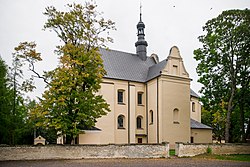| |||||
| Decades: | |||||
|---|---|---|---|---|---|
| See also: | |||||
The following lists events that happened during 2014 in Poland .
| |||||
| Decades: | |||||
|---|---|---|---|---|---|
| See also: | |||||
The following lists events that happened during 2014 in Poland .
| Position | Person | Party | Notes |
|---|---|---|---|
| President | Bronisław Komorowski | Independent (Supported by the Civic Platform) | |
| Prime Minister | Donald Tusk | Civic Platform | Until 22 September 2014 |
| Ewa Kopacz | Civic Platform | From 22 September 2014 | |
| Marshal of the Sejm | Ewa Kopacz | Civic Platform | Until 22 September 2014 |
| Jerzy Wenderlich | Democratic Left Alliance | 22 September 2014 - 24 September 2014 (Acting) | |
| Radosław Sikorski | Civic Platform | From 24 September 2014 | |
| Marshal of the Senate | Bogdan Borusewicz | Independent (Supported by the Civic Platform) |
| National party | European party | Leader | Popular vote | Percentage | Seats |
|---|---|---|---|---|---|
| Civic Platform | EPP | Donald Tusk | 2,271,215 | 32.13% | 19 / 51 |
| Law and Justice | ECR | Jarosław Kaczyński | 2,246,870 | 31.78% | 19 / 51 |
| Democratic Left Alliance–Labour Union | PES | Leszek Miller | 667,319 | 9.44% | 5 / 51 |
| Congress of the New Right | None | Janusz Korwin-Mikke | 505,586 | 7.15% | 4 / 51 |
| Polish People's Party | EPP | Waldemar Pawlak | 480,846 | 6.8% | 4 / 51 |
| Other | Varies | Varies | 897,488 (Total) | 12.7% (Total) | 0 / 51 |
| Total and turnout | 7,502,336 | 23.83% | 51 | ||

